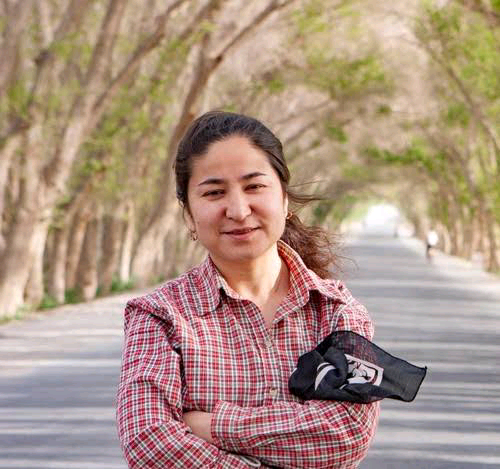Confirmation that acclaimed Uyghur ethnography professor, Rahile Dawut, who founded a Uyghur folklore institute at China’s Xinjiang University and is well-known internationally, has been sentenced to life imprisonment by Chinese authorities in Xinjiang province has sent shock waves through the international academic community and among human rights activists.
Dui Hua, a humanitarian organisation campaigning for better treatment of detainees in China, confirmed on 21 September that Dawut is serving a life sentence for endangering state security, known as ‘splittism’ in China, citing a reliable source in the Chinese government.
It was the first confirmation of Dawut’s sentence to emerge since she disappeared six years ago.
“The sentencing of Professor Rahile Dawut to life in prison is a cruel tragedy, a great loss for the Uyghur people, and for all who treasure academic freedom,” said John Kamm, executive director of the Dui Hua Foundation.
“I call for her immediate release and safe return to her family.”
While nothing had been known of her whereabouts since her disappearance in 2017, Dui Hua had previously been told by a Chinese official that Dawut was tried in December 2018, one year after her detention, by an intermediate people’s court in Xinjiang. She was convicted and appealed the sentence.
“The most recent information confirmed that her appeal was subsequently rejected by the Xinjiang Uyghur Autonomous Region High People’s Court,” Dui Hua said, adding that “Dui Hua is unaware of any acquittals in cases of splittism in recent years. Such trials are held in secret.”
International condemnation
The Open Society University Network (OSUN) condemned the decision of a Chinese court to sentence Dawut.
It noted in a statement that she was named the first ever OSUN Honorary Professor of Humanities in 2020 and described her as “a brilliant teacher and researcher whose work has guided a generation of young scholars worldwide in deepening our knowledge of Uyghur culture”.
Calling on the Chinese government to release her and allow her to resume her important work immediately, OSUN said: “The court’s sentence is an assault on academic freedom, the Uyghur people, and the rule of law.”
SOAS University of London, in a statement on 26 September, said that Dawut had collaborated with SOAS in previous research projects on Uyghur folklore and traditions.
“At SOAS we are committed to protecting academic freedom, which includes the freedom to conduct research that is responsive to the marginalised communities of our world.
“The news of her imprisonment is devastating, and we collectively call for her immediate and safe release,” the statement read.
“Professor Dawut’s sentence is not evidence of any wrongdoing on her part, but of Beijing’s unrelenting cultural persecution of Uyghurs, hostility to free expression and disdain for fair trial rights – all serious violations of international law,” said Sophie Richardson, China director at Human Rights Watch.
“This development should catalyse renewed international calls for an independent investigation into crimes against humanity in Xinjiang and prompt the academic institutions with which Dawut has had ties, including Cambridge, Cornell, and Harvard universities, to call for her immediate release,” Richardson added.
International profile
At the time of her detention in December 2017, Dawut was teaching at Xinjiang University College of Humanities in the Xinjiang capital Urumqi. She founded the Ethnic Minorities Research Centre at the university in 2007 and has conducted field work throughout Xinjiang, cementing her reputation as a cutting-edge ethnographer.
She had been a member of the Chinese Communist Party for many years and received awards and grants from China’s Ministry of Culture.
Dawut lectured widely, including at Harvard University, Cornell University and the University of British Columbia, among others, and was a visiting scholar at the University of Pennsylvania, Washington University, Indiana University and the University of Cambridge.
Rachel Harris, a professor of ethnomusicology at SOAS University of London who knows Dawut well, told University World News: “We’ve known for some time that it’s likely that she’s been given this life sentence. What’s changed this week is that we’ve had clear confirmation from a Chinese official.
“The reason why we know a lot about Rahile is that she was very well networked among foreign academics,” Harris noted, adding that Duwat was one of many Uyghur intellectuals persecuted by the Chinese state.
“Rahile was one of hundreds, possibly thousands of Uyghur intellectuals — academics, writers, creative artists — who were detained in 2017 to 2018. We don’t have a clear figure on how many of these Uyghur intellectuals were detained because of the very high levels of secrecy that China maintains around its policies in the Xinjiang region.
“We do now have the profiles of over 300 of these Uyghur intellectuals, thanks to individual searching, testimonies from friends and families, and hard work by human rights organisations,” Harris said, noting these were only the ones that organisations have been able to get information about.
“The problems that the authorities had with her work was that she was researching Uyghur culture. Over the past few years there’s been a very clear policy from China which has come right from the top, so we can understand it through the speeches of President Xi Jinping, for example and this policy is one of cultural assimilation.
“It’s one of rewriting the history of the Uyghur region in order to tie that history and to tie the culture of its peoples much more tightly into the Chinese polity,” said Harris.
“Rahile’s research was about Uyghur religious practice, about shrine pilgrimage, about the stories of the saints that are told by the Uyghur people. It was about the very rich, expressive culture, songs, oral narratives,” Harris said. “All of that very remarkable research that she did really came into contradiction with this new vision of history which is now being promoted by the Chinese government.”
Harris added: “We believe that is the primary reason why she has been disappeared, and also why her research has been disappeared — over the past few years, almost all her publications have been removed from circulation.”
Previous party support
Before her disappearance, during her journey from Xinjiang to Beijing to attend an academic conference in 2017, Dawut’s work was recognised and supported by the Chinese government.
In 2016, just a year before she was initially detained, Dawut received a research grant from the Ministry of Culture, reportedly the largest ever for a Uyghur research project.
While around a million Uyghurs have been reportedly detained in re-education camps in Xinjiang since 2017, the Chinese government has more recently been keen to show that many of these camps have been dismantled and that life in Xinjiang is returning to ‘normal’.
“But what is ‘normal’ about imprisoning for life an anthropology professor with knowledge and talent, and who is an asset to China?” Henryk Szadziewski, director of research at the Uyghur Human Rights Project (UHRP), asked University World News.
“The Chinese state has taken a wrecking ball to any expressions of Uyghurness outside of its purview. As a gifted academic documenting Uyghur knowledge, targeting Rahile is no coincidence,” he said.
UHRP has urged universities to lodge renewed formal protests over the persecution of Uyghur intellectuals and to reconsider their terms of engagement with the Ministry of Education of the People’s Republic of China.
“Rahile’s imprisonment represents not only a personal tragedy but also a broader assault on Uyghur culture and identity. It is a loss for all of humanity, as it demonstrates that scholarship and knowledge-sharing are targets of authoritarian regimes and genocidal actions,” said Omar Kanar, UHRP executive director.
In 2014 another prominent Uyghur academic, Ilham Tohti, who taught at the University of Nationalities (Minzu University) in Beijing, was sentenced to life in prison for advocating basic economic, cultural, religious and political rights for Uyghurs.














